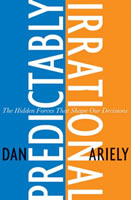As a marketing strategist, I’m always looking for information to help understand human psychology. Predictably Irrational (by Dan Ariely) is full of wonderful insights (based on original research) on the surprising differences between logical thought and emotional consumer action. It seems that the world does not operate according to standard economic theories.
Each chapter explores different forces that shape our behavior in ways we don’t truly understand (or underestimate) – what he calls “decision illusions”.
For example, Chapter 1 (The Truth About Relativity) explains that our choices are not based on absolute thinking, but on relative/local choices. For example, would you rather purchase an online subscription to the Economist magazine for $59/year or a print subscription for $125/year? What if there was a third choice: print+online for $125/year (the same price as print-only)? It turns out that high-priced items on menus and in catalogs serve as decoys: by having a high-priced item, you see the lower-priced items as a bargain and increase your spending to the next-highest priced item.
Chapter 2 (The Fallacy Of Suppy And Demand) describes a different phenomenon: we quickly anchor to a starting value of a product/service and color our perception through this anchor. That’s why in an ad you might see a price initially stated, but then the advertising copy goes on to increase the value and drop the price. It’s a deal that you don’t want to pass up. But the initial value of the offering was arbitrary, and you’ve anchored your mind around the relative price difference. To get out of this thinking, you need to evaluate the produce/service not only to its competition, but also its true value to you.
Chapter 3 (The Cost of Zero Cost) describes the psychological power of FREE. People will jump on free offers (even though a low-cost offer may be an amazing deal, FREE is an offer you can’t seemingly pass up). The author encourages policy strategists to use FREE to drive people’s actions (healthcare screenings, electric cars, etc.).
The book is an easy/fun read, and humbly shows you just how much we don’t really understand about our actions. If you want some additional FREE insights (including videos and research studies), go to Dan’s website.

One thought on “Predictably Irrational”